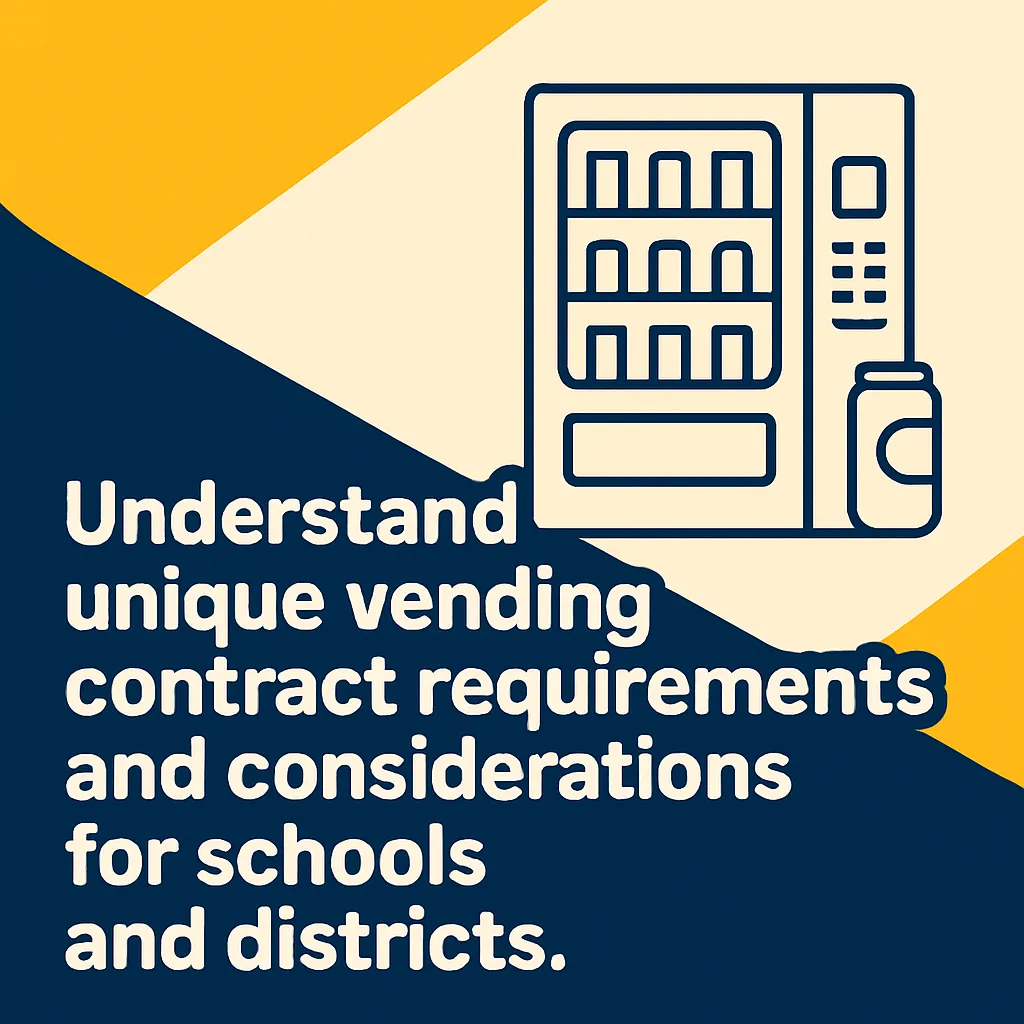Vending Contracts for Schools: Key Considerations
Understand unique vending contract requirements and considerations for schools and districts to ensure compliance and student well-being.
Back to Vending Contracts ResourcesUnderstand unique vending contract requirements and considerations for schools and districts to ensure compliance and student well-being.
Back to Vending Contracts ResourcesSecuring the right vending contract for your school involves careful consideration of student needs, nutritional standards, and operational efficiency. A well-structured agreement ensures optimal product selection and reliable service.
![]() Ensure compliance with all state and federal nutrition guidelines
Ensure compliance with all state and federal nutrition guidelines
![]() Negotiate favorable commission rates for school fundraising or programs
Negotiate favorable commission rates for school fundraising or programs
![]() Promote student health and well-being with diverse and appealing options
Promote student health and well-being with diverse and appealing options

Vending contracts for schools are crucial legal documents that define the terms of service between a school or district and a vending provider. Unlike commercial contracts, school vending agreements carry additional responsibilities related to student well-being, nutritional standards, and community expectations. Understanding these nuances is essential for school administrators to secure contracts that are both financially beneficial and align with educational missions.
A primary consideration in any school vending contract is adherence to federal, state, and local nutrition guidelines. The USDA Smart Snacks in School standards, for instance, set specific requirements for foods and beverages sold in vending machines during the school day. Contracts must explicitly detail how the vending provider will ensure compliance, including product selection, portion sizes, and ingredient transparency. Failure to comply can lead to penalties and damage to a school's reputation. Schools looking to establish these guidelines often consult resources like a healthy snack policy for schools to ensure all bases are covered.
Beyond compliance, schools should actively negotiate contract terms that benefit the student body and school resources. This includes commission rates, which represent a percentage of sales returned to the school, often used for student activities or school improvements. Service level agreements (SLAs) are also vital, outlining expectations for machine uptime, restocking frequency, cleanliness, and repair response times. Clear terms prevent disputes and ensure consistent service quality. For a deeper dive into financial aspects, understanding the cost of vending services for schools can inform negotiations.
A comprehensive vending contract should also address safety and accessibility. This means ensuring machines are securely installed and maintained to prevent accidents, and that they meet ADA accessibility standards. Furthermore, some schools involve parent-teacher organizations or student councils in the discussion of product offerings, fostering community engagement and providing options that cater to diverse preferences and dietary needs, including healthy vending compliance for schools. By prioritizing these elements, schools can create a vending program that truly serves their community.
Key components often include product offerings, pricing, commission rates, service schedules, maintenance responsibilities, and adherence to school nutrition guidelines.
School nutrition guidelines, such as the USDA Smart Snacks in School standards, dictate the types of snacks and beverages that can be sold, requiring contracts to specify compliant products.
Yes, schools can absolutely negotiate commission rates, which are typically a percentage of sales. Higher-traffic locations may command more favorable rates.
Contract lengths can vary, but commonly range from one to five years, often with options for renewal based on performance and satisfaction.
The vending provider is typically responsible for all aspects of machine maintenance, repairs, restocking, and cash collection, as detailed in the contract.
Yes, elementary schools often have stricter guidelines, focusing on smaller portion sizes, lower sugar content, and age-appropriate, healthy options.
Contracts should specify ADA compliance for machine placement and design, ensuring accessibility for students with disabilities.
Vending contracts should include service level agreements (SLAs) specifying response times for repairs and penalties for consistent underperformance or unresolved issues.
Yes, many schools choose to explicitly request and contract for machines stocked exclusively with healthy, compliant snacks and beverages to align with wellness goals.
Some contracts allow for customization, including the option to feature local products or even school-branded merchandise or snack items, if feasible for the provider.